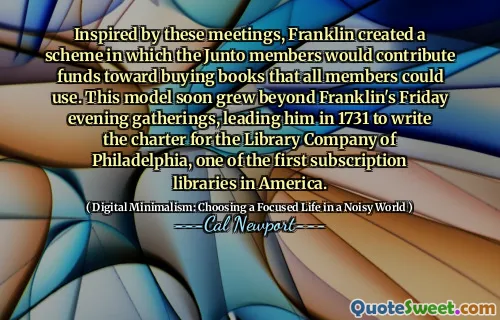
Inspired by these meetings, Franklin created a scheme in which the Junto members would contribute funds toward buying books that all members could use. This model soon grew beyond Franklin's Friday evening gatherings, leading him in 1731 to write the charter for the Library Company of Philadelphia, one of the first subscription libraries in America.
Benjamin Franklin's initiative to establish a subscription library highlights the profound impact of collective effort and shared knowledge. The concept of pooling resources to access a wider array of books underscores a forward-thinking approach to learning and community building. This model not only democratized access to reading materials but also fostered a culture of intellectual curiosity and mutual support among members. Franklin's vision exemplifies how collaboration can accelerate the spread of knowledge and cultural development.
From a modern perspective, this early form of a community library echoes the principles of open access and collaborative learning that are central to today's educational and informational systems. Franklin recognized that individual resources could be combined to overcome limitations, allowing more people to benefit from literature, ideas, and education. His foresight in formalizing these efforts through the Library Company demonstrates the importance of institutional support in sustaining a shared intellectual environment.
Moreover, Franklin's translation of informal gatherings into an organized, institutional structure reflects strategic foresight. It illustrates how informal ideas can evolve into lasting institutions that contribute significantly to societal progress. The Library Company of Philadelphia became a pioneering model, influencing the development of libraries and collaborative learning organizations in America. Franklin’s emphasis on community, shared resources, and education emphasizes values that remain vital today. As we continue to navigate an era inundated with information, his example reminds us of the power of collective effort and strategic organization in fostering access to knowledge and cultivating informed communities.







